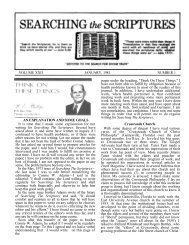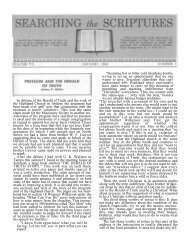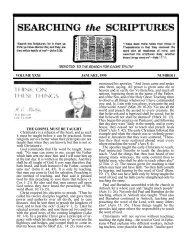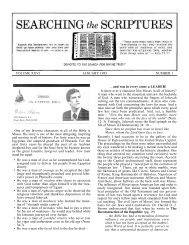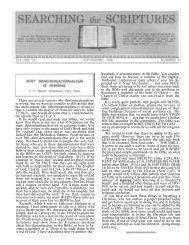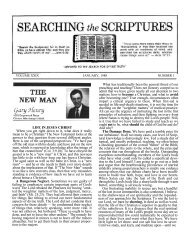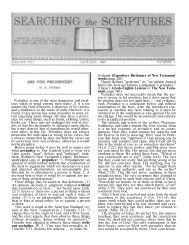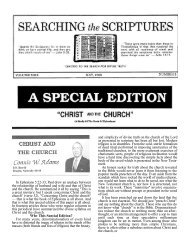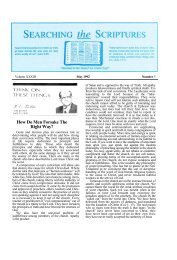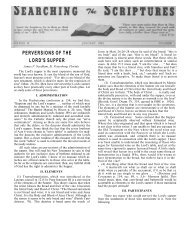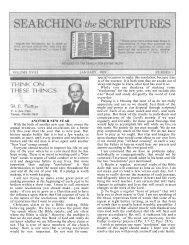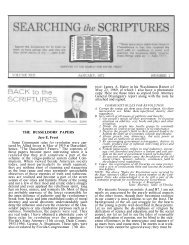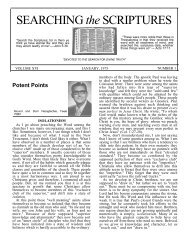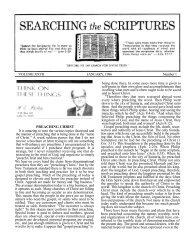Volume 21 – 1980 (PDF) - Searching The Scriptures
Volume 21 – 1980 (PDF) - Searching The Scriptures
Volume 21 – 1980 (PDF) - Searching The Scriptures
You also want an ePaper? Increase the reach of your titles
YUMPU automatically turns print PDFs into web optimized ePapers that Google loves.
Page 8<br />
automobile accident, or an assassin's bullet, and in the<br />
next moment he lies before us a lifeless corpse, his plans<br />
unrealized. Thus James taught us that we should make<br />
our plans subject to the will of God. "If the Lord will,<br />
we shall do this or that." Some one has well said that,<br />
Man proposes, but God disposes. Which means that<br />
God has a way of bringing the best laid plans of man to<br />
nought.<br />
So because of the brevity of life, it was thus David's<br />
plea that God would<br />
Teach Us To Number Our Days.<br />
How much we need to remember that time is a<br />
precious commodity, and should not be wasted. During<br />
the past few years governments have become greatly<br />
concerned about the rapid depletion of non-renewable<br />
resources, — natural gas and crude oil. <strong>The</strong>y are now<br />
telling us that the known supplies are rapidly dwindling<br />
and could conceivably come to an end in the near future.<br />
<strong>The</strong>refore they are urging us to use what we have to the<br />
best advantage. While this is a matter to be deeply<br />
concerned about, of far more importance is the need to<br />
realize that time is also non-renewable. Once it is gone it<br />
is beyond recall.<br />
Jesus taught both by word and example the value of<br />
time. On one occasion he said: "I must work the works<br />
of him that sent me while it is day: the night cometh<br />
when no man can work" (John 9:4). He lived about<br />
thirty three years on earth, and his personal ministry<br />
occupied but three and a half of those years. Yet think<br />
of what he accomplished in that time (John <strong>21</strong>:25). And<br />
all because he realized the value of time, and used it to<br />
the best advantage.<br />
<strong>The</strong> apostle Paul also taught us something of the<br />
value of time when he wrote: "Look carefully how ye<br />
walk, not as unwise, but as wise; redeeming the time<br />
because the days are evil" (Eph. 5:16). A footnote offers<br />
as an alternative reading, "buying up the opportunity."<br />
<strong>The</strong> idea suggested is that our lifetime is a time of<br />
opportunity. We redeem that time by making use of the<br />
opportunities as they come. Since the same opportunity<br />
never presents itself more than once, if we do not make<br />
use of it when it comes, it is lost forever.<br />
A Proper Sense Of Values Needed<br />
In placing a proper value on our time, we need to<br />
have a proper sense of values, and apportion our time<br />
accordingly. This raises the question of, How much of<br />
my time is given to preparation for eternity as compared<br />
to the time that is spent in earthly pursuits?<br />
Some years ago I read an article by some one whose<br />
name I have forgotten, the substance of which was a<br />
breakdown of the average life of sixty five years and the<br />
amount of time spent in various activities. I remind you<br />
again that the figures given were the average, and not<br />
necessarily true of everyone. <strong>The</strong> facts presented were as<br />
follows:<br />
1. Three years spent in education. That is as if one<br />
were to attend school twenty four hours a day for 1095<br />
days.<br />
2. Eight years spent in amusements. I presume that<br />
this represented time spent in watching television and<br />
attending ball games.<br />
3. Six years spent eating. I remind you that this is<br />
the average.<br />
4. Five years spent in transportation. That would be<br />
the time we spend in our cars and other conveyances,<br />
going to and coming from work and other places.<br />
5. Four years spent in conversation. Remember, this<br />
is average.<br />
6. Fourteen years spent in work. Based on a forty<br />
hour week, I presume.<br />
7. Twenty four years spent in sleep. So when the<br />
fabled Rip Van Winkle slept for twenty years, he got<br />
nearly all his at once.<br />
8. Three years spent in sickness and convalescence.<br />
For some, this figure may seem abnormally high, but<br />
was given as the average.<br />
<strong>The</strong> interesting (and disturbing) aspect of the article<br />
was that it went on to point out that if one were to<br />
spend one hour each week in a church service, that in<br />
those sixty five years it would have added up to less<br />
than five months. Think of it! Sixty four years spent in<br />
pursuit of things that will benefit the body which one<br />
day will return to the dust from whence it came. Less<br />
than five months spent in preparation of the soul for<br />
eternity. Yet how many there are who think that an<br />
hour spent in worship on Lord's day morning fulfills<br />
their responsibility insofar as spiritual necessities are<br />
concerned. Such a concept is the result of a mixed up<br />
sense of values.<br />
Yes, this life, which is a time of sowing, is short.<br />
Eternity, which is the time of harvest, is long. Lord,<br />
teach us to number our days!



